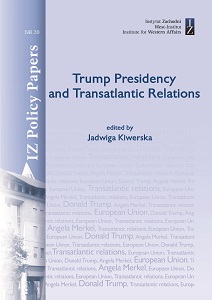Trump Presidency and Transatlantic Relations
Trump Presidency and Transatlantic Relations
Author(s): Marta Götz
Subject(s): International relations/trade, Geopolitics
Published by: Instytut Zachodni im. Zygmunta Wojciechowskiego
Keywords: Trump; USA; president; transatlantic realtions
Summary/Abstract: The key question that arose following the election victory of Donald Trump concerned the future of US-European relations. Would the opinion that NATO was “obsolete” and art. 5 of the Washington Treaty on collective defense did not necessarily have to apply unconditionally, remain pure electoral rhetoric or would it set a new course for the Trump administration’s relations with Europe? Would the treatment of the European Union not as a big achievement of the Old World but as a hostile competitor of the United States define Trump’s approach to the European integration process? Will Washington’s prior commitments to Europe continue to be respected? // Another unknown was the approach to the new Washington administration that the European allies of the United States would adopt. Could they convince President Trump about the significance of the Transatlantic Alliance and its main pillar: NATO? Would the new administration and Brussels be able to establish good mutually-beneficial relations? // The above questions stand at the core of the analysis presented in this material. The authors attempted to describe Trump’s first six months in office and outline the key steps taken by the new administration towards Europe. Emphasis was placed on security and defense, associated primarily with NATO, as well as Russia and political and economic relations with the European Union. An additional topic was the fight against terrorism, which inevitably accompanies transatlantic relations.
Series: IZ Policy Papers
- Print-ISBN-13: 978-83-61736-69-1
- Page Count: 88
- Publication Year: 2017
- Language: English
Mid-Year Review of Trump Presidency
Mid-Year Review of Trump Presidency
(Mid-Year Review of Trump Presidency)
- Author(s):Jadwiga Kiwerska
- Language:English
- Subject(s):Politics, Governance, Public Administration, Public Law, Geopolitics
- Page Range:11-44
- No. of Pages:34
- Keywords:Trump; USA; presidency
- Summary/Abstract:As he bid his final farewell to the presidential office in January 2017, Barack Obama left the world in a fairly poor condition. Although the outgoing president can hardly be blamed for any of the international problems and threats, he could not be absolved from such responsibility being a leader of the world’s most powerful nation. On the other hand, on assuming his country’s highest office in January 2009, he too inherited a range of challenges and unresolved conflicts from his predecessor, George W. Bush Jr. These included the global financial and economic crises, the unresolved war on terrorism, the threat of the proliferation of nuclear weapons, the failure to benefit in any way from the deployment of US forces in Iraq and Afghanistan, the rise of new global centers of power and ambition, tensions in relations with Russia, and finally, highly strained transatlantic relations.
European Assessment of Trump Presidency
European Assessment of Trump Presidency
(European Assessment of Trump Presidency)
- Author(s):Jacek Kubera, Tomasz Morozowski
- Language:English
- Subject(s):Politics, Governance, Public Administration, Public Law, Geopolitics
- Page Range:45-70
- No. of Pages:26
- Keywords:Trump; USA; presidency
- Summary/Abstract:Barack Obama’s presidency brought a great deal of changes to US foreign policy. While even in its preliminary premises of the new administration, the United States was to continue playing a leading role in strengthening the world order, the assumption was that it would mainly rely on diplomatic efforts rather than military interventions and that it would minimize the cost. By “leading from behind”, following through with the previously announced “reset” in Russian relations and pivoting towards Asia and the Pacific Rim in foreign policy, the United States sent a message that understandably upset its European allies. Without a doubt, the new approach would impact the Transatlantic Alliance. There was a neccessity for Europe to become more active internationally and more responsible for its own security.
The European Union and the United States vs. Terrorism
The European Union and the United States vs. Terrorism
(The European Union and the United States vs. Terrorism)
- Author(s):Sebastian Wojciechowski
- Language:English
- Subject(s):Governance, Public Administration, Public Law, Security and defense, Geopolitics
- Page Range:71-80
- No. of Pages:10
- Keywords:European Union; USA; terrorism
- Summary/Abstract:The interests of the European Union and its member states and those of the United States are divergent if not mutually exclusive on a range of issues. During the first six months of Donald Trump’s presidency, such differences came into sharp relief. Nevertheless, there are still a number of issues in transatlantic relations on which cooperation continues to be good due to shared security priorities. Other than drug and weapons trafficking, an excellent example is the fight against terrorism. Close cooperation in combatting terrorism began after the 9/11 al-Qaeda attack on America. Ties grew even closer after the terrorist attacks on Europe, first in Madrid on March 11, 2004, and then in London on July 7-21, 2005. Another factor was the escalation of threats from ISIS.
Prospects for Transatlantic Relations
Prospects for Transatlantic Relations
(Prospects for Transatlantic Relations)
- Author(s):Jadwiga Kiwerska, Jacek Kubera, Tomasz Morozowski
- Language:English
- Subject(s):Politics, Governance, Public Administration, Public Law, Geopolitics
- Page Range:81-87
- No. of Pages:7
- Keywords:transatlantic relations; Trump; USA
- Summary/Abstract:Prior experience with Donald Trump’s Presidency reveals a likely ongoing shift away from the decades-old paradigm of close relations between the United States and Europe. Such relations extend not only to politics, defense and the economy but also to culture and social issues. Forged after World War II and bolstered with the experience and effectiveness of the Transatlantic Alliance, the relationship became highly uncertain through the steps of the new administration and European reactions. Its dismantling is not a done deal. It is still conceivable that, after a period of turbulence and chaos observed in the wake of the White House changeover, the transatlantic community may regain strength.

